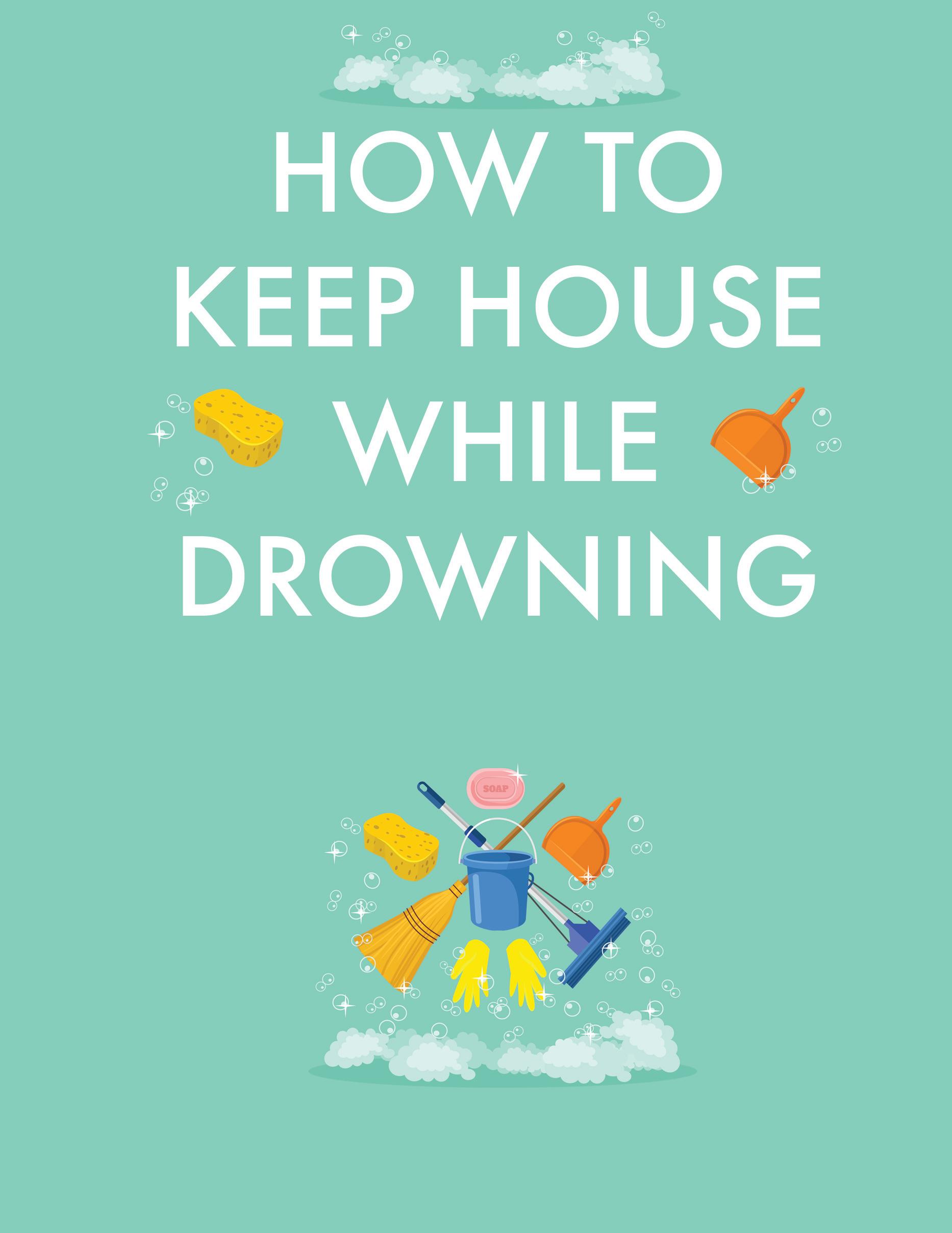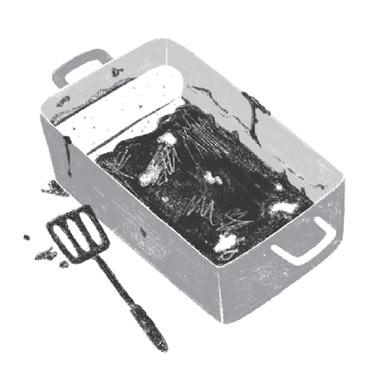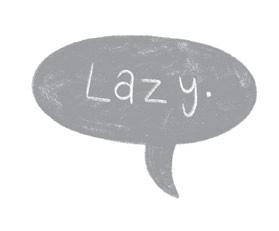A gentle approach to cleaning and organising

KC DAVIS
A gentle approach to cleaning and organising
KC DAVIS
about the author
kc
Davis is a licensed professional therapist, author, and speaker. She is the creator of the mental health platform Struggle Care, where she shares a revolutionary approach to self and home care for those dealing with mental health, physical illness, and hard seasons of life. KC’s own home descended into chaos when she began suffering from anxiety and postnatal depression. She also received a late diagnosis of adult ADHD that shed additional light on why everyday care tasks were so difficult for her. Now she is a speaker and advocate for mental health and recovery. Professionally, KC has worked most of her career in the field of addiction in roles such a therapist, consultant, and executive director. She lives in Houston with her husband and two daughters.
A gentle approach to cleaning and organising
A gentle approach to cleaning and organising PENGUIN
KC DAVIS
KC DAVIS
BOOK S
PENGUIN BOOKS
UK | USA | Canada | Ireland | Australia
India | New Zealand | South Africa
Penguin Books is part of the Penguin Random House group of companies whose addresses can be found at global.penguinrandomhouse.com
First published in the US by Simon Element 2022
First published in the UK by Cornerstone Press 2022
Published in Penguin Books 2024
001
Copyright © KC Davis, 2020, Katherine Davis, 2022
The moral right of the author has been asserted
Interior design by Jennifer Chung
Illustrations by Lydia Ellen Greaves
Happy icon by Austin Condiff/The Noun Project
Printed and bound in Great Britain by Clays Ltd, Elcograf S.p.A.
The authorised representative in the EEA is Penguin Random House Ireland, Morrison Chambers, 32 Nassau Street, Dublin D02 YH68
A CIP catalogue record for this book is available from the British Library
ISBN: 978–1–529–15941–7
www.greenpenguin.co.uk
Penguin Random Hous e is committed to a sustainable future for our business , our readers and our planet. is book is made from Forest Stewardship Council® certified paper.
This book is dedicated to my family.
contents how to read this book viii introduction 1 chapter 1 care tasks are morally neutral 10 chapter 2 kindness to future you 12 chapter 3 for all the self-help rejects 14 chapter 4 gentle skill building: the five things tidying method 19 chapter 5 gentle self-talk: mess has no inherent meaning 25 chapter 6 care tasks are functional 29 chapter 7 gentle self-talk: find the compassionate observer 34 chapter 8 organized is not the same as tidy 37 chapter 9 susie with depression 41 chapter 10 gentle skill building: kick-starting motivation 43 chapter 11 care tasks are cyclical 50 chapter 12 gentle skill building: setting functional priorities 53 chapter 13 women and care tasks 56 chapter 14 gentle skill building: laundry 57
chapter 15 you can’t save the rain forest if you’re depressed 65 chapter 16 drop the plastic balls 67 chapter 17 gentle skill building: doing the dishes 72 chapter 18 when you don’t have kids 76 chapter 19 when it’s hard to shower 77 chapter 20 caring for your body when you hate it 84 chapter 21 gentle self-talk: “i am allowed to be human” 86 chapter 22 good enough is perfect 88 chapter 23 gentle skill building: changing bedsheets 90 chapter 24 rest is a right, not a reward 91 chapter 25 division of labor: the rest should be fair 96 chapter 26 gentle skill building: bathrooms 104 chapter 27 gentle skill building: a system for keeping your car clean 106 chapter 28 when your body doesn’t cooperate 107 chapter 29 contributing is morally neutral 109 chapter 30 cleaning and parental trauma 111 chapter 31 critical family members 115 chapter 32 rhythms over routines 117 chapter 33 gentle skill building: maintaining a space 122 chapter 34 my favorite ritual: closing duties 128 chapter 35 skill deficit versus support deficit 131 chapter 36 outsourcing care tasks is morally neutral 133 chapter 37 exercise sucks 136 chapter 38 your weight is morally neutral 138 chapter 39 food is morally neutral 140 chapter 40 getting back into rhythm 142 chapter 41 you deserve a beautiful sunday 143 acknowledgments 145 appendix 1 147 appendix 2 149
how to read this book
this book has been designed for maximum accessibility for readers who are neurodivergent. Words are printed in a sans serif font and left angled to make reading the text easier. Paragraphs and chapters are short and main points are bolded to account for both attention and comprehension needs, and literal interpretations are offered of any metaphors used for clarity.
I have written this book to be comprehensive without being too long or intimidating. However, if you feel you do not have the capacity to read the whole book right now, please follow my shortcut journey through the book. This abridged way of reading the book should only take you thirty minutes to one hour depending on your reading speed. Begin with the first page.
in February 2020 I had my second baby. Having struggled with postpartum anxiety in a previous pregnancy and knowing that my husband’s new job was going to have him working seven days a week, I set up a comprehensive postpartum support plan for myself. My toddler would go to preschool four days a week, family would rotate in every week for the first two months, a cleaning service would come in once a month, and the new moms group I had helped form would drop off food and stop by to offer a hand. I was so proud of my plan—and it ended before it even began. Three weeks after I gave birth, covid lockdowns were announced and the entire thing collapsed overnight. The world got very small. Very fast. Days rolled into each other in a sleepless strand of breastfeeding difficulties, toddler meltdowns, and, soon, depression. Numb and overwhelmed by the isolation, I watched my house crumble around me. I tried every day

introduction
to figure out how to take care of both babies’ needs at once, and I went to bed every night haunted by my failure. As I lay in bed I dared to think things I was too frightened to say out loud: “What if I have made a huge mistake? Maybe I am only capable of being a good mom to one kid. Maybe I’m not cut out for caring for two. I don’t understand how anyone does this. I am failing them.” One day my sister began sending me funny TikTok videos. “You have to get on this video app. I feel like it would cheer you up to laugh.” I relented and even got the courage one day to make a post of my own: a video making light of the house turned disaster we had been living in. To the background of a viral audio that sang about all the shit that wasn’t going to get done that day, I showed shots of my messy living room, my overflowing sink, and the enchilada pan I had left to fend for itself for three days. “No pipe dreams here!” I quipped in the description, tacking on the hashtag #breastfeeding. Surely, from the annals of the internet, moms everywhere would rally to chuckle in solidarity at how hard it is to have a newborn baby. Instead, I got this comment: There it was. The word that had haunted me for so much of my life. As I was a messy and creative woman with undiagnosed ADHD, that word held a deep and cutting power. Like a snake, I felt the voice that visited me nightly crawl up my throat, wrap its body around my neck, and hiss into my ear, “See? I told you you were failing.” My professional experience as a therapist had shown me time and time again that being overwhelmed is not a personal failure, but as most of you may know, the gulf between what we know in our minds and what we feel in our hearts is often an insurmountable

2 introduction
distance. In that moment, I couldn’t help but absorb that lie that my inability to keep a clean home was direct evidence of my deep character failing of laziness.
In reality, this could not be further from the truth. I’d birthed a baby with no pain medication after meticulous research and planning; I’d pumped breast milk every three hours to get her through her NICU stay and continued to wake six times a night to breastfeed after bringing her home. I got up every day despite the postpartum depression to care for my newborn and my toddler all day long. I even managed to make homemade enchiladas. And I did all of that while my vagina was literally being held together by stitches.
But to this person on the internet, because my home wasn’t clean, I was failing. I was lazy.
Were the dishes sky-high and the laundry unfinished? Yes. Did I feel like I was drowning when it came to accomplishing even simple tasks around my home? Absolutely.
I was tired.
I was depressed.
I was overwhelmed.
I was in need of help.
But I was not lazy.
And neither are you.
3
introduction
what are care tasks and why are they so hard for people?
Care tasks are the “chores” of life: cooking, cleaning, laundry, feeding, dishes, and hygiene. These may seem like noncomplex tasks. But when you actually break down the amount of time, energy, skill, planning, and maintenance that go into care tasks, they no longer seem simple. For example, the care task of feeding yourself involves more than just putting food into your mouth. You must also make time to figure out the nutritional needs and preferences of everyone you’re feeding, plan and execute a shopping trip, decide how you’re going to prepare that food and set aside the time to do so, and ensure that mealtimes come at correct intervals. You need energy and skill to plan, execute, and follow through on these steps every day, multiple times a day, and to deal with any barriers related to your relationship with food and weight, or a lack of appetite due to medical or emotional factors. You must have the emotional energy to deal with the feeling of being overwhelmed when you don’t know what to cook and the anxiety it can produce to create a kitchen mess. You may also need the skills to multitask while working, dealing with physical pain, or watching over children.
Now let’s look at cleaning: an ongoing task made up of hundreds of small skills that must be practiced every day at the right time and manner in order to “keep going on the business of life.” First, you must have the executive functioning to deal with sequentially order-
4 introduction
ing and prioritizing tasks.1 You must learn which cleaning must be done daily and which can be done on an interval. You must remember those intervals. You must be familiar with cleaning products and remember to purchase them. You must have the physical energy and time to complete these tasks and the mental health to engage in a low-dopamine errand for an extended period of time. You must have the emotional energy and ability to process any sensory discomfort that comes with dealing with any dirty or soiled materials. “Just clean as you go” sounds nice and efficient, but most people don’t appreciate the hundreds of skills it takes to operate that way and the thousands of barriers that can interfere with execution.
Health and hygiene are far more complex than “eat healthy and shower.” You must possess the social skills to call the doctor and attend appointments. You must have the time and energy to fill prescriptions and, again, the executive functioning to take the medications every day. Even tasks that appear to be secondhand thoughts to most people—brushing your teeth, washing your hair, changing your clothes—can become almost impossible in the face of functional barriers.
In my work as a therapist I have seen hundreds of clients who struggle with these issues, and I am convinced now more than ever of one simple truth: they are not lazy. In fact, I do not think laziness exists.
You know what does exist? Executive dysfunction, procrastination, feeling overwhelmed, perfectionism, trauma, amotivation,
1 Executive functioning skills include focusing, planning, organizing, following directions, and more. introduction
5
chronic pain, energy fatigue, depression, lack of skills, lack of support, and differing priorities.
ADHD, autism, depression, traumatic brain injury, and bipolar and anxiety disorders are just some of the conditions that affect executive function, making planning, time management, working memory, and organization more difficult, and tasks with multiple steps intimidating or boring.
There is an old saying that neurons that fire together wire together. It simply means that your brain can start associating feelings with certain experiences. This means that if a person was in an abusive situation either as a child or in a domestic partnership where cleaning or mess was used as punishment or was the subject of abuse then that person is going to have post-traumatic stress around housekeeping and they may avoid it because it triggers their nervous system.
When barriers to functioning make completing care tasks difficult, a person can experience an immense amount of shame. “How can I be failing at something so simple?” they think to themselves. The critical internal dialogue quickly forms a vicious cycle, paralyzing the person even further. They are unlikely to reach out for help with these tasks due to intense fear of judgment and rejection. As shame and isolation increase, mental health plummets. Self-loathing sets in and motivation vanishes. Sadly, this is often compounded by critical and cruel comments that friends and family make. Being labeled as lazy cements the belief that struggling to complete these simple tasks is, at its core, a moral failure.
If you are crying (or wincing internally) right now, this book is
6 introduction
for you. You are not lazy or dirty or gross. You are not a failure. You just need nonjudgmental and compassionate help. slow, quiet, gentle
So how is this book different from other self-help books? For one, I don’t have a program; I have a philosophy: You don’t exist to serve your space; your space exists to serve you.
Internalizing this belief will help you a) shift your perspective of care tasks from a moral obligation to a functional errand, b) see what changes you actually want to make, and c) weave them into your life with minimal effort, relying not on self-loathing but on self-compassion.
I arrived at this philosophy both through my training and work as a therapist and through my own experience of thinking, for decades, that the way I presented myself and my home determined my worthiness as a person. Even when this motivated me to make “positive” or “productive” changes, they didn’t solve my dislike of myself—and the “life improvements” didn’t stick for long.
As a teenager, I was so ferociously obsessed with being seen as worth saving that I tried to embody the tragically broken drug addict archetype of Nirvana fame. When I was sent to rehab for a year and a half at the age of sixteen, I was able to crawl out of the addiction but found myself just anxious to be thought of as the poster child of a “good client” as a substitute for genuine selfworth. Even a very real experience of religious faith was hijacked by my need to fill this hole. After becoming a missionary and
7 introduction



